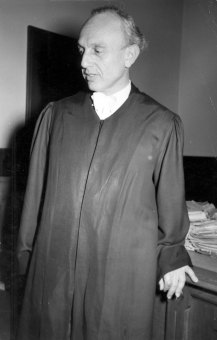Summation of Henry Ormond in the Trial Court

© Fritz Bauer Institute (collection of Thomas Ormond)
Norbert Wollheim’s attorney, Henry Ormond, linked his summation to a newspaper article from the Handelsblatt, which denied any financial responsibility on the part of industry for crimes committed during the Third Reich and referred to the political “solution,” that is, to already concluded “compensation agreements.” Ormond disagreed vehemently
In conclusion, Ormond recapitulated the statements of the witnesses; in this regard, he reproached the defense witnesses with bias and obstinacy.
Further, Wollheim’s lawyer contrasted, in detailed fashion, the statements of the plaintiff’s witnesses with those of the witnesses for I.G. Farben and thus rebutted the whitewashed depiction of the working and living conditions in the Buna/Monowitz concentration camp offered by I.G. Farben: “Sadly, it is thanks to this worldwide pharmaceutical and chemical giant that under its leadership, death gathered in a rich harvest at the plant and camp and in the Monowitz infirmary.”[2]
The second part of his summation is Ormond’s comment on the last written pleading of I.G. Farben in the proceedings on April 11, 1953. Wollheim’s attorney systematically made into mincemeat the pleading’s contradictions and false assertions—for example, that the I.G. Farben employees had known nothing about the conditions in the concentration camp, that I.G. Farben had been coerced into using prisoners, and so forth: “That they [deceased prisoners] nonetheless failed to leave their workplace in I.G. Farben’s Buna-Monowitz forced labor camp must be attributed solely to the accused, and all the attempts of the accused to shift the guilt to others are of no avail here.”[3]
The speech ended with a request to the judges for a “just decision in the case.”[4]
(SP; transl. KL)
















